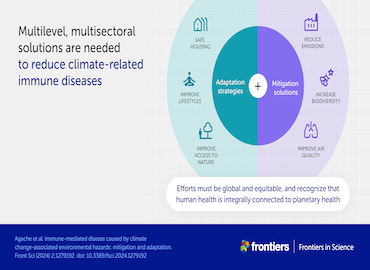Climate change, pollution and the loss of biodiversity have a serious impact on the normal function of the immune system!

5 April 2024
This is the conclusion of a study conducted by several researchers, with Prof. Dr. MD Ioana Agache, within the Faculty of Medicine, Transilvania University of Brașov, as the first author.
Published by Frontieres in Science, the scientific article draws attention to the fact that human health is increasingly suffering because the ecosystems in which we live no longer function as they used to. Excessive pollution, climate change and the lack of exposure to biodiversity cause a dramatic increase in the medical conditions that affect the immune system: asthma, neoplastic diseases and cardio-vascular or metabolic diseases.
Dr. MD Ioana Agache, Professor at Transilvania University of Brașov, President of the European Academy of Allergy and Clinical Immunology (EAACI) from 2017 to 2019, and leader of the EAACI guidelines on Environmental Science for Allergy and Asthma takes the view that “From the perspective of evolution, the immune system is constantly being shaped to respond appropriately to environmental challenges and to maintain health. Recent environmental changes have been too rapid for our immune systems to adapt accordingly. The effects of climate change and anthropogenic pollution on our bodies are complex, but a crucial factor is the adverse impact they have on the immune system. Exposure to pollutants damages the epithelial barrier, which entails the dysregulation of the immune system, eventually leading to allergic, autoimmune diseases and cancer. The lack of exposure to adequate biodiversity impacts the proper calibration of the immune system, which results in increased incidence of allergic diseases and asthma. Rising temperatures are changing pollen seasons so that the season starts earlier and lasts longer, and the released pollen causes stronger allergic reactions, increasing the prevalence and severity of pollen-induced allergies. Climate change is amplifying the frequency and severity of natural disasters, with significant repercussions on health”.
The team of researchers calls for urgent actions to protect a healthy future for the planet and mankind.
The full article can be read at:
https://www.frontiersin.org/journals/science/articles/10.3389/fsci.2024.1279192/full



